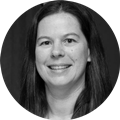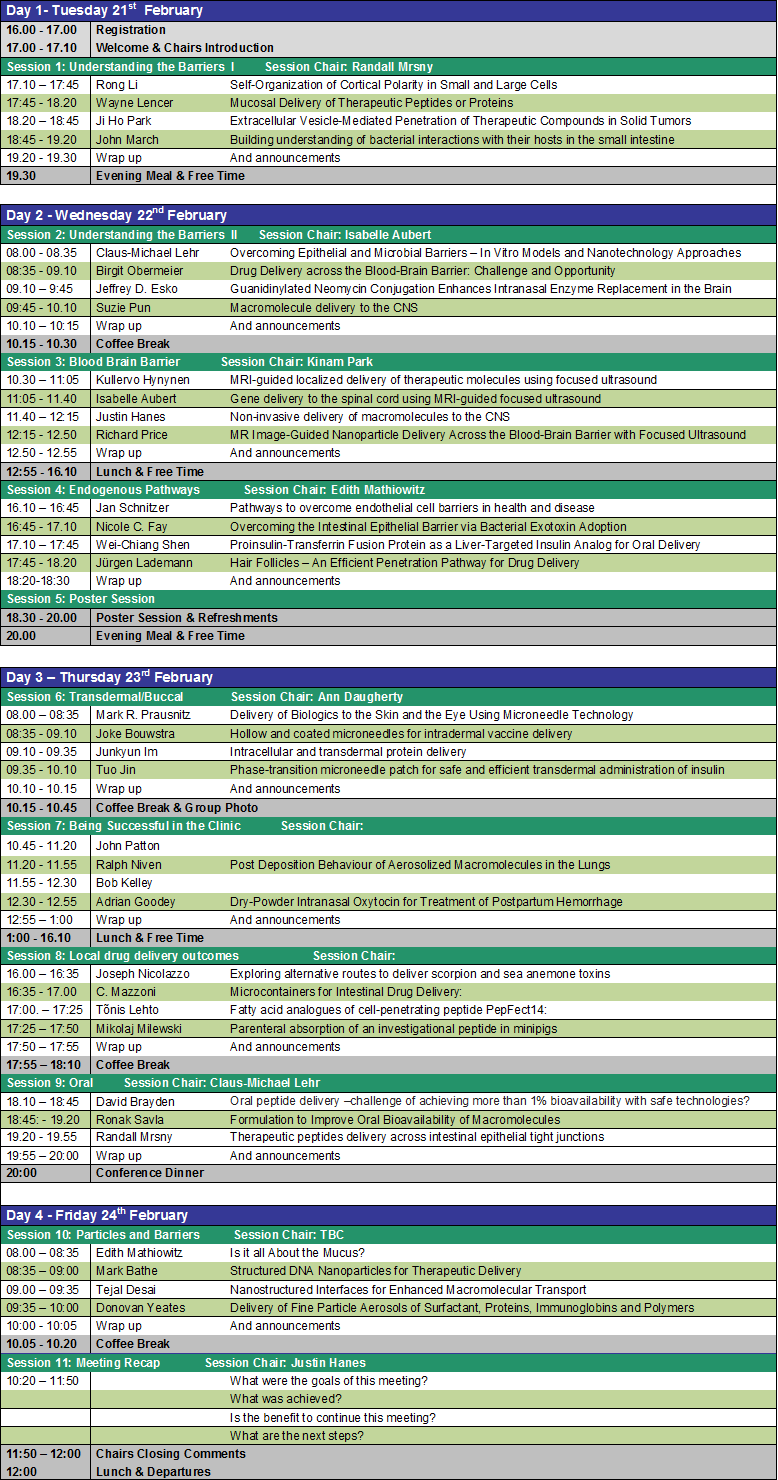OVERVIEW
Scientific progress over the last three decades has resulted in a multitude of macromolecular biologic therapeutics – mostly proteins and peptides. Effective and efficient delivery of these biopharmaceuticals has been limited to traditional injections. Administration of these biopharmaceuticals using a variety of novel minimally invasive approaches would offer not only the potential for increased patient compliance but also improved safety/efficacy in certain instances. Many common issues must be addressed to successfully develop various strategies being explored for oral, transdermal, nasal, pulmonary, and ocular delivery. Another set of challenges lies in the delivery of macromolecules across the blood-brain barrier for the treatment of neurological diseases such as Alzheimer’s and Parkinson’s diseases. Experts will present on the biological hurdles of the blood-brain barrier and delivery approaches using ultrasound, magnetic resonance image guidance, or nanoparticles.
A new meeting has now been organized to bring together experts from these various fields of drug delivery. The goal of this meeting is to provide an open and creative forum for academic and industrial scientists to discuss the spectrum of activities (from concept to clinical testing) required for successful development of clinical products. The program will foster learning and fully explore oral, transdermal, nasal, pulmonary, and ocular deliveries as well as delivery across the blood-brain barrier in one fully integrated conference.
CONFERENCE CHAIRS

Kinam Park, Ph.D.
Showalter Distinguished Professor of Biomedical Engineering
Professor of Pharmaceutics
Kinam Park received his Ph.D. degree in pharmaceutics from University of Wisconsin in 1983. After a postdoctoral training at the Department of Chemical Engineering of the same university for 2 years, he joined the faculty of the Purdue University in 1986 and promoted to Full Professor of Pharmaceutics in 1994. Since 1998, he has had the joint appointment in Department of Biomedical Engineering, and became Showalter Distinguished Professor of Biomedical Engineering in 2006. He has published more than 200 peer-reviewed papers, 70 book chapters, and presented 190 abstracts at national and international meetings. He has also made more than 200 invited lectures throughout the world. He co-authored and co-edited 7 books in the area of controlled drug delivery, and edited special journal issues in the area of protein- and cell-repellent surfaces and in the area of hydrogels. He founded Akina, Inc. specializing in drug delivery technologies in 2001.

Randy Mrsny, Ph.D.
University of Bath, Chair of the NMDC
Randall Mrsny obtained a BS degree in Biochemistry and Biophysics and a PhD degree in Anatomy and Cell Biology from the University of California at Da avis undergraduate and medical school campuses, respectively. As an NIH post-doctoral fellowship he studies membrane lipid-protein interactions at the Institute of Molecular Biology located in the University of Oregon Eugene campus. Prior to taking Professors’ post in Cardiff University and now the University of Bath, Randy led research groups in two companies: ALZA and Genentech. He has been involved in starting two new biotech companies through the acquisition of venture capital funding. Randy has been elected president of an international society and organized international meeting. He currently serves as a reviewer or advisor for multiple international agencies and companies.

Isabelle Aubert, Ph.D.
Professor of Laboratory Medicine & Pathobiology, University of Toronto
Dr. Isabelle Aubert obtained her PhD from the Department of Neurology and Neurosurgery at McGill University. Her graduate work was done at the Douglas Research Institute, in the laboratory of Dr. Rémi Quirion, co-supervised by Dr. Serge Gauthier. As a Medical Research Council (MRC) fellow, Dr. Aubert conducted her post-doctoral training with Dr. Fred Gage at The Salk Institute for Biological Studies. In 1998, Dr. Aubert returned to Canada to establish her laboratory at Sunnybrook Research Institute (SRI). She is currently Senior Scientist at SRI and Professor in the Department of Laboratory Medicine and Pathobiology at the University of Toronto. Her research is based on therapeutic development to stop degeneration and promote regeneration in the brain under pathological conditions such as Alzheimer’s disease. Her recent work uses MRI-guided focused ultrasound to deliver molecules, genes and cells from the blood to targeted areas of the brain without the need for invasive surgeries. Her goal is to develop treatments that will better mental health and restore and preserve critical cognitive functions such as learning and memory in patients with Alzheimer’s disease.

Cornell Stamoran, Ph.D.
Catalent Institute Board Member, Vice President, Strategy & Corporate Development, Catalent Pharma Solutions
Dr. Stamoran has spent nearly 25 years engaged with the healthcare industry, and has experienced the realities of patient adherence and outcomes enhancement from almost every stakeholder perspective: from direct engagement with retail and hospital pharmacists; medical professionals; specialty pharmacies and clinics; and pharmacy benefit managers and payers. He has directly participated in adherence and outcomes enhancement strategies for more than 150 drugs over the last 10 years.

AGENDA
Non-Invasive Delivery of Macromolecules Conference 2017

Please Note: This conference programme is subject to change.
We will always display the most current version of the programme on the conference webpage.
We recommend periodically reviewing the document to be aware of any alterations.





